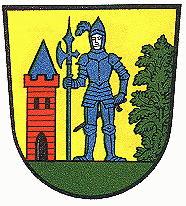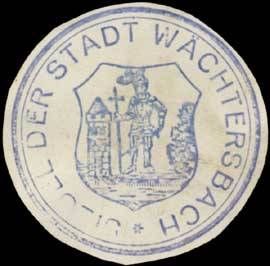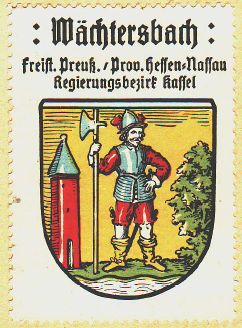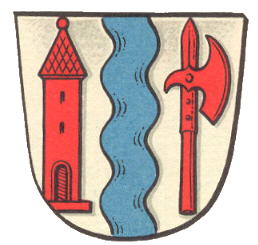Wächtersbach: Difference between revisions
Knorrepoes (talk | contribs) |
Knorrepoes (talk | contribs) |
||
| Line 12: | Line 12: | ||
====Origin/meaning==== | ====Origin/meaning==== | ||
The arms were granted in 1982 and show a canting sentry (Wächter), taken from the historical arms (see below). The base shows a river (bach) with two small black bars. These represent the former county of Isenburg, to which the villages of Hesseldorf, Weilers, Wittgenborn, Waldensberg and Leisenwald historically belonged. Aufenau and Neudorf are represented by the hook, taken from the arms of the Forstmeister von Gelnhausen | The arms were granted in 1982 and show a canting sentry (Wächter), taken from the historical arms (see below). The base shows a river (bach) with two small black bars. These represent the former county of Isenburg, to which the villages of Hesseldorf, Weilers, Wittgenborn, Waldensberg and Leisenwald historically belonged. Aufenau and Neudorf are represented by the hook, taken from the arms of the Forstmeister von Gelnhausen family, who ruled the villages for a long time. | ||
The historical arms: | The historical arms: | ||
[[File:wachters.jpg|center]] | [[File:wachters.jpg|center|Wappen von {{PAGENAME}}|center]] | ||
Wächtersbach received city rights in 1404 from the Lords of Isenburg who ruled the city. The local branch of the family later named themselves later Von Wächtersbach. There are no historical seals or images known from the city prior to 1742. The arms first appear on a stone decoration from 1742. The arms already showed the canting knight (Wachter, or sentry) between a tower (the city) and the tree (the woods). The arms also appear on the oldest seal, which also dates from the 18<sup>th</sup> century. | Wächtersbach received city rights in 1404 from the Lords of Isenburg who ruled the city. The local branch of the family later named themselves later Von Wächtersbach. There are no historical seals or images known from the city prior to 1742. The arms first appear on a stone decoration from 1742. The arms already showed the canting knight (Wachter, or sentry) between a tower (the city) and the tree (the woods). The arms also appear on the oldest seal, which also dates from the 18<sup>th</sup> century. | ||
Revision as of 05:59, 26 August 2016
This page is part of the German heraldry portal |
Heraldry of the World |
|
German heraldry:
|
Selected collector's items from Germany:
|
WÄCHTERSBACH
State : Hessen
District (Kreis) : Main-Kinzig Kreis (until 1974 Gelnhausen)
Addirtions : 1971 Aufenau, Hesseldorf, Leisenwald, Neudorf, Waldensberg, Weilers, Wittgenborn
Official blazon
Origin/meaning
The arms were granted in 1982 and show a canting sentry (Wächter), taken from the historical arms (see below). The base shows a river (bach) with two small black bars. These represent the former county of Isenburg, to which the villages of Hesseldorf, Weilers, Wittgenborn, Waldensberg and Leisenwald historically belonged. Aufenau and Neudorf are represented by the hook, taken from the arms of the Forstmeister von Gelnhausen family, who ruled the villages for a long time.
The historical arms:
Wächtersbach received city rights in 1404 from the Lords of Isenburg who ruled the city. The local branch of the family later named themselves later Von Wächtersbach. There are no historical seals or images known from the city prior to 1742. The arms first appear on a stone decoration from 1742. The arms already showed the canting knight (Wachter, or sentry) between a tower (the city) and the tree (the woods). The arms also appear on the oldest seal, which also dates from the 18th century.
| Seal from around 1900 |
The arms by Hupp in the Kaffee Hag albums +/- 1925 |
A simplified proposal from 1956 |
Contact and Support
Partners:
Your logo here ?
Contact us
© since 1995, Heraldry of the World, Ralf Hartemink 
Index of the site
Literature : Stadler, K. : Deutsche Wappen - Bundesrepublik Deutschland. Angelsachsen Verlag, 1964-1971, 8 volumes.
















